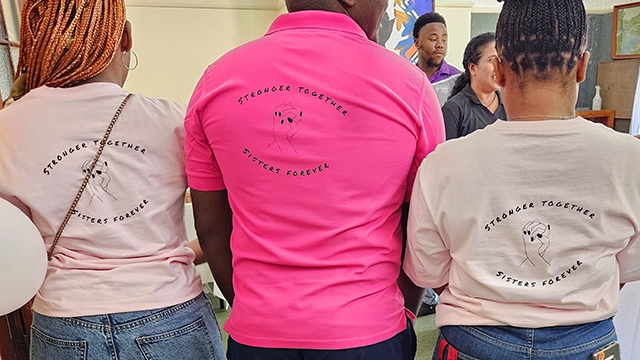
By: The Division of Communications & Advancement
The appointment of a male House Warden for Robert Sobukwe Residence, a female residence, at Rhodes University is a decision that may seem unconventional to some, considering the dysfunctional stereotypes that permeate university residences and halls across the globe. However, this choice reflects a progressive step towards gender neutrality and inclusivity, challenging the narratives associated with leadership roles in academic institutions. It underscores the importance of capability over gender, promoting a culture where leadership qualities are not confined to or defined by one's gender.
Firstly, it is essential to recognise the symbolic significance of this appointment within the broader context of higher education and societal norms. Traditional gender roles have often dictated that caretaking and nurturing roles, arguably a part of a House Warden's responsibilities, are more suited to women. By appointing a male House Warden, especially for a female residence, Rhodes University challenges these norms and asserts that qualities such as empathy, accountability, and leadership are not inherently male or female traits but human attributes. This move can be a powerful statement against gender stereotypes, encouraging a more inclusive and diverse understanding of leadership.
Moreover, selecting a male House Warden for Robert Sobukwe Residence can profoundly impact the student community. It provides a unique opportunity for students to experience and benefit from diverse leadership styles and perspectives, which is crucial for their development as well-rounded individuals. Having a male figure can offer a new role model for female students, showing them that their gender does not limit their career paths or social roles. Similarly, female students can see this as an affirmation that traditional gender expectations do not bind their potential.
At the residence, a Transformation Representative (T-Rep) mentioned: "Having a male warden, particularly ours, is more of a privilege than anything. He is constantly trying to learn from us about issues that could be major concerns to us. His enthusiasm towards creating a comfortable space for us inspires me." T-Reps, placed at all residences, receive specialist training on gender-based violence and intimate partner violence to execute tailored programs/workshops on a peer-to-peer model of engagement that deal with issues around consent, reporting processes, etc. The initiative is currently being reconfigured.
However, this decision does not come without its challenges. One potential concern is the reaction from the university community and beyond. There may be scepticism or resistance from those who believe that specific roles should be gender-specific, based on the assumption that women are naturally more suited to roles that involve care and emotional intelligence. Overcoming these prejudices requires continuous education and dialogue about gender roles and the capabilities of individuals, regardless of gender.
Another challenge lies in ensuring that the male House Warden is equipped to handle issues that may be sensitive or traditionally seen as 'female concerns.' This includes matters related to female health, safety, and well-being. It is crucial that the appointed warden receives adequate training and support to address these issues competently and sensitively, ensuring that all residents feel supported and safe under his care. In response, the T-Rep said: “Our warden has shown dedication towards learning about and embracing female-related issues. An example is his support towards our pad drive; he acknowledged our problem as ladies and gave us funding to start the initiative for O-Week to ensure that our first year's basic needs were met.” It is also worth noting that Rhodes University appointed a female head sub-warden.
Despite these challenges, appointing a male House Warden at Rhodes University's Robert Sobukwe Residence is a progressive step towards dismantling gender biases and fostering an environment of equality and inclusion. It serves as a reminder that leadership and care are not gender-specific qualities but human ones. This decision can pave the way for more institutions to follow suit, promoting a culture where individuals are valued and selected for roles based on their abilities and potential, rather than their gender.
The House Warden had this to say: “Since the beginning of the year, I have spent considerable time speaking to the students, both leaders and the rest of the house, and I have a feeling that the majority have embraced the arrangement and it seems like we all want to make it work… I was allowed to have a head sub-warden, and I have one who is very enthusiastic, and I think she is doing a brilliant job.”
While the appointment of a male House Warden for a female residence may raise eyebrows for some, it is a testament to Rhodes University's commitment to challenging gender norms and promoting inclusivity. It represents a significant step towards redefining leadership and dismantling outdated stereotypes, offering valuable lessons in diversity and equality. As society continues to evolve, it is crucial that institutions like Rhodes University lead by example, showing that progress lies not in adhering to traditional norms but in embracing and celebrating the richness of human diversity.
